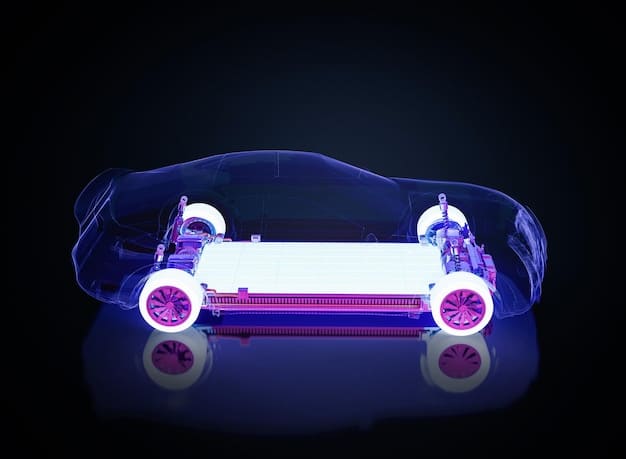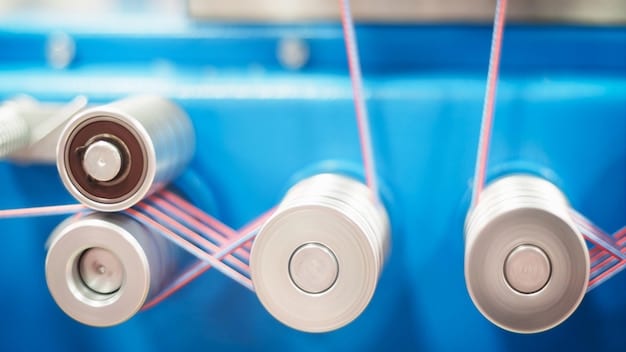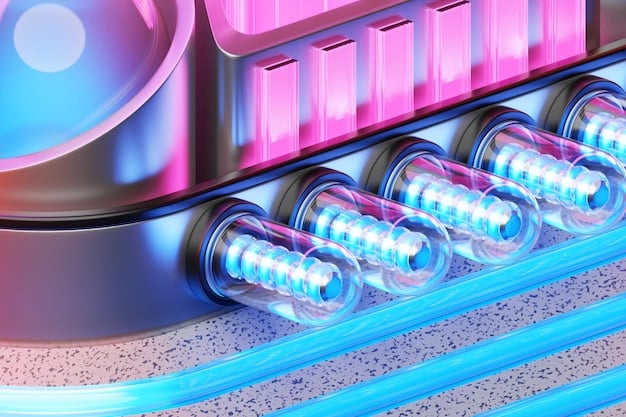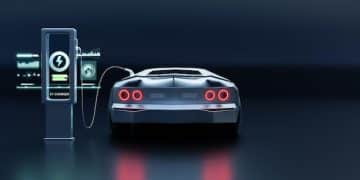US Automakers Lead Solid-State Battery Race for EVs

US Automakers Race to Develop Solid-State Batteries: A Game Changer for Electric Vehicles? Solid-state batteries promise higher energy density, improved safety, and faster charging times, potentially revolutionizing the electric vehicle market and giving US automakers a competitive edge.
The automotive industry is undergoing a massive transformation with the shift towards electric vehicles (EVs). At the heart of this revolution lies battery technology, and US Automakers Race to Develop Solid-State Batteries: A Game Changer for Electric Vehicles?. This technological leap could redefine the performance, safety, and affordability of EVs, potentially reshaping the future of transportation.
The Promise of Solid-State Batteries
Solid-state batteries are emerging as the next-generation battery technology, offering significant advantages over traditional lithium-ion batteries that currently dominate the EV market. These advantages stem from the replacement of the liquid electrolyte with a solid electrolyte, leading to improved safety, energy density, and potentially lower costs.
Enhanced Safety
One of the most significant benefits of solid-state batteries is their enhanced safety. Liquid electrolytes in lithium-ion batteries are flammable and can lead to thermal runaway, causing fires or explosions. Solid electrolytes are non-flammable, significantly reducing the risk of such incidents.
Higher Energy Density
Solid-state batteries can potentially store more energy for a given size and weight compared to lithium-ion batteries. This higher energy density translates to longer driving ranges for EVs without increasing the battery pack size or weight.
- Increased driving range for EVs
- Reduced risk of fires and explosions
- Faster charging times
- Potential for lower costs
The development of solid-state batteries represents a pivotal step towards safer, more efficient, and affordable electric vehicles. US automakers are heavily invested in this technology to secure a competitive advantage in the rapidly evolving EV market.

US Automakers: The Leaders in the Solid-State Battery Race
Several US automakers are at the forefront of solid-state battery development, making substantial investments in research and partnerships to accelerate the commercialization of this technology. These companies recognize the transformative potential of solid-state batteries and are strategically positioning themselves to lead the charge in the next generation of EVs.
Ford
Ford has been actively pursuing solid-state battery technology through strategic investments and partnerships. The company is working with Solid Power, a leading solid-state battery developer, to bring this technology to its future EVs. Ford aims to have solid-state batteries in its vehicles by the end of the decade.
General Motors (GM)
GM is also heavily invested in solid-state battery technology. The company is developing its own solid-state battery through a joint venture with SolidEnergy Systems (SES). GM plans to incorporate solid-state batteries into its Ultium platform, which serves as the foundation for its future EVs.
US automakers are dedicating significant resources to secure their position as leaders in the emerging solid-state battery market. This investment not only aims to enhance their product offerings but also to support the long-term viability and competitiveness of the American automotive industry.
The Technical Challenges of Solid-State Batteries
While solid-state batteries offer numerous advantages, their development and commercialization face several technical challenges. Overcoming these hurdles is crucial to realizing the full potential of this technology.
Interface Resistance
One of the primary challenges is the high resistance at the interface between the solid electrolyte and the electrodes. This resistance can impede the flow of ions, reducing the battery’s performance.
Material Stability
Ensuring the long-term stability of the solid electrolyte is another significant challenge. The solid electrolyte must be able to withstand the electrochemical stresses during charging and discharging without degrading.
- Reducing interface resistance
- Improving material stability
- Scaling up manufacturing
Efforts are underway to address these challenges through innovative materials and manufacturing processes. Overcoming these technical hurdles is essential for the widespread adoption of solid-state batteries in EVs.

Impact on the Electric Vehicle Market
The successful commercialization of solid-state batteries is poised to have a profound impact on the electric vehicle market. These batteries could address key limitations of current EV technology, making EVs more appealing to a broader range of consumers.
Increased Driving Range
Solid-state batteries could significantly increase the driving range of EVs, alleviating “range anxiety,” which is a major concern for potential EV buyers.
Faster Charging Times
Solid-state batteries are expected to enable faster charging times, reducing the inconvenience of long charging sessions.
With superior safety, performance, and convenience, solid-state batteries have the potential to accelerate the adoption of EVs and transform the automotive landscape. This technological shift would not only benefit consumers but also advance global sustainability goals.
The Role of Government and Regulation
Government policies and regulations play a crucial role in supporting the development and adoption of solid-state batteries. Incentives, funding, and regulatory frameworks can accelerate the progress of this technology.
Funding for Research and Development
Government funding for research and development helps to de-risk early-stage technologies and attract private investment. This support is vital for overcoming technical challenges and accelerating the commercialization of solid-state batteries.
Incentives for Adoption
Policies such as tax credits and subsidies can incentivize consumers to purchase EVs with solid-state batteries. These incentives can help to drive demand and accelerate the adoption of this technology.
Strategic government support is essential for fostering innovation and ensuring that the US remains competitive in the global race to develop and commercialize solid-state battery technology. By creating a supportive ecosystem, governments can help to unlock the full potential of this transformative technology.
The Future of Solid-State Batteries in EVs
The future of solid-state batteries in electric vehicles is bright, with ongoing research and development efforts promising further improvements in performance and cost. As technology matures, solid-state batteries are expected to become a standard feature in EVs.
Advancements in Materials
Ongoing research efforts are focused on developing new solid electrolyte materials with improved ionic conductivity and stability. These advancements will lead to higher-performing batteries with longer lifespans.
Manufacturing Scale-Up
As solid-state battery technology matures, efforts will shift towards scaling up manufacturing processes to reduce costs and increase production volumes. This will make solid-state batteries more accessible to a wider range of EV models.
With continued innovation and investment, solid-state batteries are poised to revolutionize the electric vehicle market, ushering in a new era of safer, more efficient, and more sustainable transportation.
| Key Point | Brief Description |
|---|---|
| ⚡️ Higher Energy Density | Solid-state batteries provide extended driving ranges for EVs. |
| 🛡️ Enhanced Safety | Non-flammable solid electrolytes reduce fire risk. |
| ⏱️ Faster Charging | Solid-state batteries enable quicker EV charging times. |
| 🤝 US Automakers | Ford and GM are leaders in solid-state battery development. |
FAQ
▼
Solid-state batteries use a solid electrolyte instead of the liquid electrolyte found in traditional lithium-ion batteries, offering improved safety and performance.
▼
Solid electrolytes are non-flammable, reducing the risk of thermal runaway and fires, which can occur with the flammable liquid electrolytes in lithium-ion batteries.
▼
Ford and General Motors (GM) are actively investing in and developing solid-state battery technology through strategic partnerships and internal research programs.
▼
Solid-state batteries offer higher energy density (longer range), enhanced safety, faster charging times, and potentially lower costs compared to traditional lithium-ion batteries.
▼
Key challenges include reducing interface resistance between the solid electrolyte and electrodes, ensuring long-term material stability, and scaling up manufacturing processes to reduce costs.
Conclusion
The race to develop solid-state batteries is a critical step in accelerating the adoption of electric vehicles. With their potential for enhanced safety, increased driving range, and faster charging times, solid-state batteries represent a game-changing technology that could reshape the future of transportation and establish US automakers as leaders in the global EV market.





